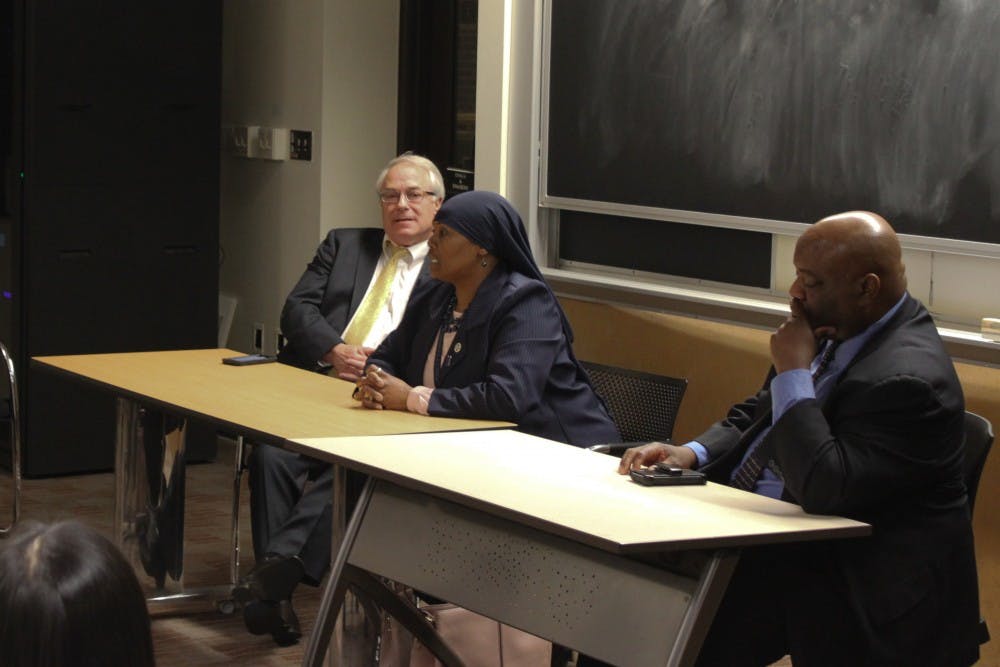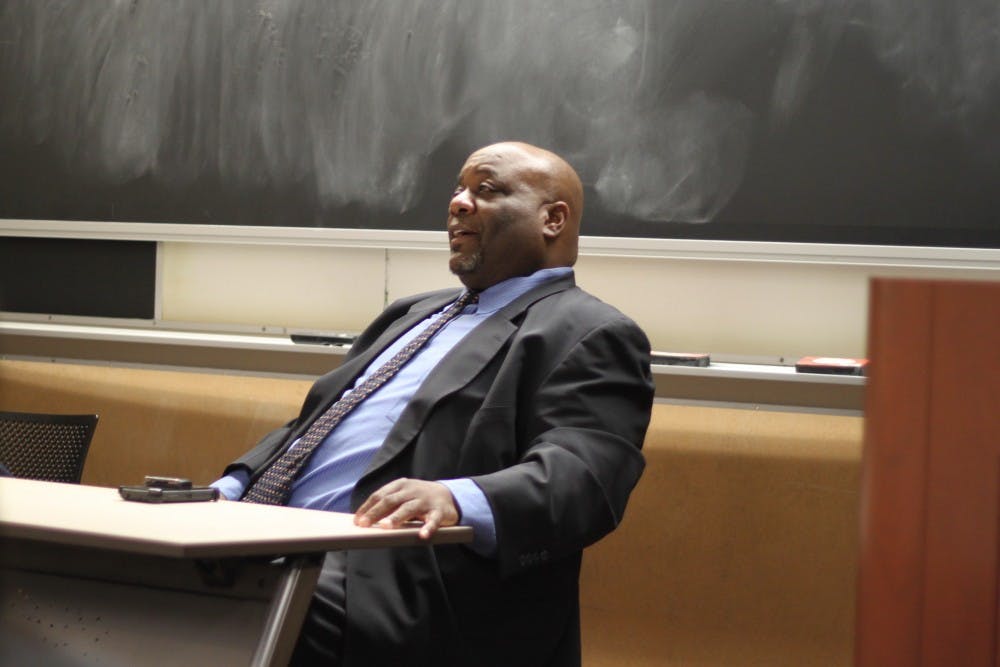
Panelists Robert K. Reed (left), Movita Johnson-Harrell, and Shondell Revell
Credit: Kasra KoushanAmid recent student walkouts in response to mass shootings, students gathered in Steinberg-Dietrich Hall on Tuesday to discuss the roots of gun violence, particularly in Philadelphia.
The American Enterprise Institute, the Public Policy Initiative Student Group, and Penn Democrats invited key policy-makers and Philadelphia activists to discuss how gun violence in Philadelphia and across the United States extends beyond the issue of gun control.
The panelists were Interim Supervisor of Victim Services of the District Attorney’s Office and 2004 School of Social Policy and Practice graduate Movita Johnson-Harrell, the Head of the City of Philadelphia’s Office of Violence Prevention Shondell Revell, and the Head of the Pennsylvania Attorney General’s Office of Public Engagement and 1975 College graduate Robert K. Reed.
While there is a national dialogue on mass shootings, gun violence is particularly prevalent in Philadelphia. Reed said that since 2001, there have been over 25,000 shot in the city of Philadelphia alone. To put this number in perspective, he had the audience picture that there are just under 20,000 seats in the Wells Fargo Center.
The panelists collectively stressed that solutions to gun violence must revolve around its surrounding circumstances — like poverty, trauma, and racism — which lead individuals to acquire guns in the first place.

Reed said that the key to understanding and solving gun violence is to consider perpetrators on an individual level.
“When you start looking at them as individuals, when you start humanizing, they are not a statistic, they are not just simply a person who’s an addict, they’re a human being," Reed said.
All three speakers emphasized that gun violence is not just an issue of poverty, but also one of racism.
“The gun violence issue has become a big deal because people think of it as a mass shooting problem, a mass shooting problem of white students in predominantly white schools,” Reed said. “These are horrible tragedies. I’m not minimizing them... but when I told you those numbers in Philadelphia, it happens all the time. It’s happening right now.”
“The part that most resonated with me was Reed’s comment about how nobody was talking about the issue of gun violence until white people, and especially white children, became the targets,” College sophomore Caitlin Harrity said.
One major topic all of the hosts touched upon was the importance of mental health and childhood trauma in relation to the likelihood of homicidal tendencies and gun violence.
“When you’re traumatized [the frontal lobe] changes dramatically, so that hyper-vigilance is actually upped a few notches,” Johnson-Harrell said. “Then when you’re a young black man living in the community and you don’t think you’re going to live to be 20 anyway, the thought of committing a homicide comes second nature.”
Wharton sophomore and Penn Democrats President Dylan Milligan asked the speakers if they had a rebuttal to those who believe steps such as background checks and extending waiting periods do not have any substantial impact on reducing gun violence.

“With respect to background checks, I will tell you, it saves lives,” Reed said.
Evan Dubchansky SP2 ‘18 asked how “aspirational traditional masculinity factors into rates of violence, and what anti-violence advocates are doing to address masculinity.”
“It’s hard for young men of color in certain situations [when] there’s not a father figure in the family,” Revell said. “That guy in the corner who has the flashy car, and has all the money, and has all the girls, and you know, is a figure that you’re gravitated to, starts to become that lead... that’s how gangs are formed.”
Revell said that it is critical in these situations to not only address the needs of these young men, but also to address the needs of the family.
“One of the things that I always say in the programs that we develop is if you’re looking at the individuals on the caseload and not the family then we’re not servicing,” Revell said. “It’s got to be a holistic program.”
Wharton sophomore and Executive Vice President of the PPI Student Group and Penn Democrats member Shoshanna Israel explained that the groups hosted the event to expand dialogue on gun violence.
“I was noticing that we were having conversations about gun violence... but we weren’t necessarily talking about what causes gun violence or what communities are already doing to address it,” Israel said. “I also thought there was a little bit of an intersectionality component, because we’re talking about mass shootings, but gun violence is so much more prevalent than that.”
The Daily Pennsylvanian is an independent, student-run newspaper. Please consider making a donation to support the coverage that shapes the University. Your generosity ensures a future of strong journalism at Penn.
Donate




